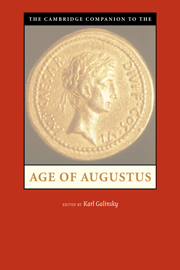Introduction
Published online by Cambridge University Press: 28 March 2007
Summary
The age of Augustus continues to fascinate. For good reason: it was unquestionably one of the pivotal periods of western history, if not world history. Its monuments and art still vividly speak to us today as do its writers: Vergil, Horace, and Ovid in particular. At center stage, of course, is the young heir of Caesar, only eighteen years old at the time his adoptive father was cut down. A charismatic personality, maybe; a flamboyant one, no; but surely one as multifaceted as the arts, politics, and social developments of the time and, certainly, the Roman empire that he accumulated, tirelessly expanded (we should not be fooled by his parting admonition to Tiberius), helped shape, and unified - which does not mean homogenized - to an unprecedented degree. In structural and material terms, a basis was laid for the system called the principate that lasted for more than 200 years; the birth of Christ during his era may convince even agnostics of divine foresight.
Great periods in world history and their leading figures are destined to keep attracting attention and undergo changing evaluations. There is more to that than the perpetually grinding mills of the scholarly (re)interpretation industry, spurred on by the usual academic rewards. Even outside this sphere, the process of reception is ever changing and shaped by multifarious factors, consumers, and producers. Every age brings its own perspectives to those before it. Such perspectives tend to be far from monolithic because they often reflect contemporary tensions. In “Augustan” England, for instance, Augustus' reputation fluctuated like a cork on the tide of violent crosscurrents - political, literary, and cultural (Weinbrot 1978).
- Type
- Chapter
- Information
- The Cambridge Companion to the Age of Augustus , pp. 1 - 10Publisher: Cambridge University PressPrint publication year: 2005
- 2
- Cited by

